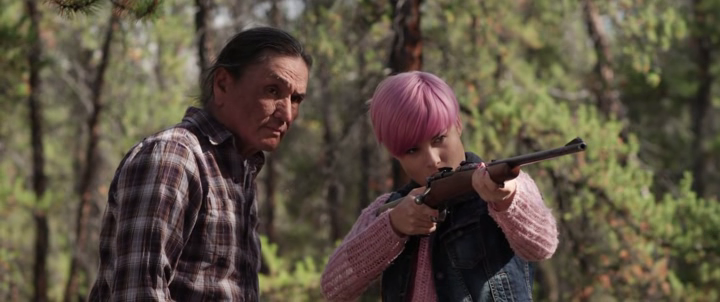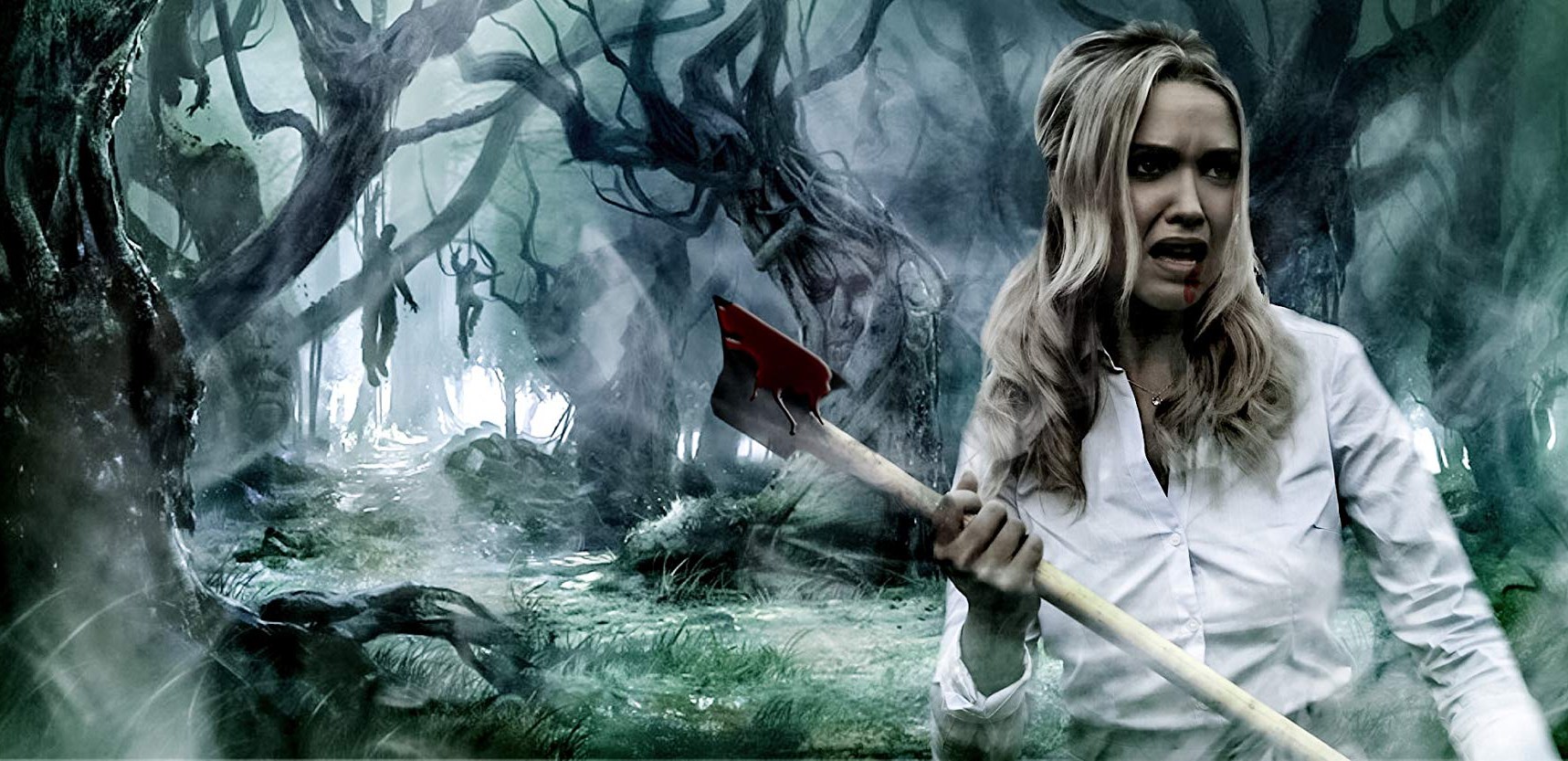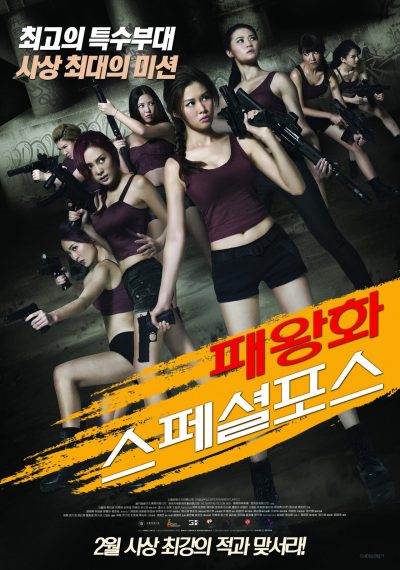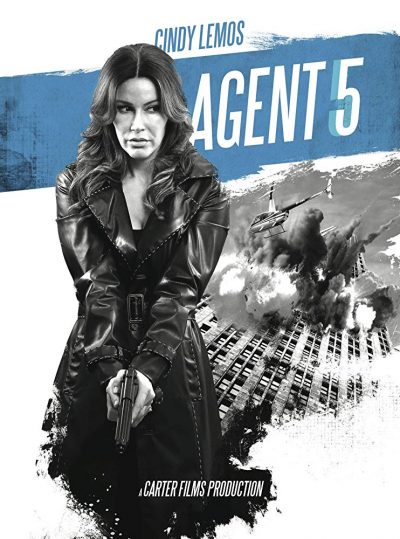★★★½
“Nothing here but mosquitoes and bear shit.”
 While certainly more relaxed that many of the films we cover here, this makes it in on the strength of its heroine’s character arc. That belongs to Lia (Jacobs), a teenage girl in the Northwest Territories of Canada, who is being raised by her father. When he has to go off for work, she gets sent north of the Arctic Circle to live with her grandmother (Jerome) for the nightless summer. She hates the rural life, and runs away, stealing a boat in the hope of reaching Dawson City, the nearest big town – not realizing it would be four weeks journey. She falls overboard after her boat breaks down, and is lucky to be rescued by Alfred (Howard), a hunter from the local Gwich’in tribe. As they cross the remote wilderness, she begins to appreciate it, bonding with the thoroughly down-to-earth Alfred and learning from him – wolves hate the smell of tobacco, apparently. But when an accident befalls her guide, Lia is going to have to dig into her own resources.
While certainly more relaxed that many of the films we cover here, this makes it in on the strength of its heroine’s character arc. That belongs to Lia (Jacobs), a teenage girl in the Northwest Territories of Canada, who is being raised by her father. When he has to go off for work, she gets sent north of the Arctic Circle to live with her grandmother (Jerome) for the nightless summer. She hates the rural life, and runs away, stealing a boat in the hope of reaching Dawson City, the nearest big town – not realizing it would be four weeks journey. She falls overboard after her boat breaks down, and is lucky to be rescued by Alfred (Howard), a hunter from the local Gwich’in tribe. As they cross the remote wilderness, she begins to appreciate it, bonding with the thoroughly down-to-earth Alfred and learning from him – wolves hate the smell of tobacco, apparently. But when an accident befalls her guide, Lia is going to have to dig into her own resources.
I’m about as much of a city mouse at Lia, whose initial opinion of the countryside is largely summed up by her line at the top. Early on, she just seems like another annoying teenager, whose attitude sits permanently between surly and self-obsessed. Admittedly, it doesn’t help that the locals don’t take to her, and she’s the subject of bullying by them, but until she meets up with Alfred, she’s not very likeable. To her credit, Lia is prepared to learn from someone who has forgotten more about the wilderness than we’ll ever know. As she grows to embrace the untamed landscape (and her hair returns to a more natural shade!), so does the viewer. Alfred clearly doesn’t stand for her city-slicker ways, yet generally disarms them with patience rather than anger, though his dispatch of an injured animal reminds us that nature can sometimes be brutal. They also bond through the shared experience of losing someone close to them – his wife and her mother respectively.
It has to be said, the drama which eventually appears toward the end is rather lacking on the dramatic front. Initially, it appears it will involve Lia in a race against time, to bring help to Alfred. However, that’s never fulfilled and it’s almost as if the director got bored of the idea and decided not to bother, instead looking around for a way to close things out in the least exciting way she could find. Similarly, Lia’s encounter with some less-friendly hunters feels an obligatory incident, unnecessary to proceedings. And, yet… It doesn’t particularly matter, in terms of my enjoyment. This is one of those movies which is considerably more about the journey than the destination, as well as (at the risk of sounding trite) the people you meet along the way. It’s undeniably low-key and understated, yet if you are in the right mood, it hits the spot, particular in its dialogue, which fits those delivering it perfectly.
Dir: Kirsten Carthew
Star: Devery Jacobs, Duane Howard, Sarah Jerome





 Yang Yang (Yang) is an impetuous young policewoman, whose career is on thin ice after shooting the target of what was supposed to be a surveillance operation. Her superior officer – who also happens to be her uncle – is forced to re-assign her, and sends Yang to operate undercover as a student in a high school from which girls have been going missing. The leading suspect is an arrogant pupil who has recently been accused of sexually assaulting a classmate. Teacher Wu Xie (Zhou) is a witness in the case, so Yang is also tasked with making sure he isn’t pressured into changing his statement. Fitting in is going to be part of the problem for Yang – despite the help of Molly (Li), who takes the “new girl” under her wing.
Yang Yang (Yang) is an impetuous young policewoman, whose career is on thin ice after shooting the target of what was supposed to be a surveillance operation. Her superior officer – who also happens to be her uncle – is forced to re-assign her, and sends Yang to operate undercover as a student in a high school from which girls have been going missing. The leading suspect is an arrogant pupil who has recently been accused of sexually assaulting a classmate. Teacher Wu Xie (Zhou) is a witness in the case, so Yang is also tasked with making sure he isn’t pressured into changing his statement. Fitting in is going to be part of the problem for Yang – despite the help of Molly (Li), who takes the “new girl” under her wing. Or, perhaps: “What Blade Runner would have been like, if android Roy Batty was a good guy.” For this appears to be a mash-up of elements from that and Battle Angel Alita. While preceding the film version of the latter, it does seem to borrow elements of the manga, not least in its depiction of a future society where there is a strict, and basically vertical, division between the haves and the have-nots. After disease and pollution have pushed society to the brink, the rich and powerful live towards the top of a self-sufficient mega-city, under the control of ice queen Lady Jiru (Ishida) and her “Sodom” cyborg enforcers, leaving everyone else struggling for scraps down below. And leaving is a death sentence, due to the viruses infecting the outside world.
Or, perhaps: “What Blade Runner would have been like, if android Roy Batty was a good guy.” For this appears to be a mash-up of elements from that and Battle Angel Alita. While preceding the film version of the latter, it does seem to borrow elements of the manga, not least in its depiction of a future society where there is a strict, and basically vertical, division between the haves and the have-nots. After disease and pollution have pushed society to the brink, the rich and powerful live towards the top of a self-sufficient mega-city, under the control of ice queen Lady Jiru (Ishida) and her “Sodom” cyborg enforcers, leaving everyone else struggling for scraps down below. And leaving is a death sentence, due to the viruses infecting the outside world. I decided I might as well combine these two into a single review. Having watched them back-to-back, even though made and set three years apart, they felt very much like the continuation of a single story about the same characters. The main one is Roxy (Mele), who is a dancer at a Wisconsin strip-club run by the sleazy Stag (Therrien), mostly as a money-laundering front for local organized crime. When he and his pal rape an employee, Alana (Pearce), Roxy along with the victim and another dancer, Crystal (Fierman), decide to take revenge by robbing Stag. That means getting into the safe in his office where the money is, and he’s not exactly going to give up the combination freely. Still, nothing that a piano-wire garrotte round the testicles can’t solve, surely? Except, as usual in this genre, the heist doesn’t go smoothly. Stag’s office quickly begins to resemble a mortuary, as unwelcome guests need to be handled.
I decided I might as well combine these two into a single review. Having watched them back-to-back, even though made and set three years apart, they felt very much like the continuation of a single story about the same characters. The main one is Roxy (Mele), who is a dancer at a Wisconsin strip-club run by the sleazy Stag (Therrien), mostly as a money-laundering front for local organized crime. When he and his pal rape an employee, Alana (Pearce), Roxy along with the victim and another dancer, Crystal (Fierman), decide to take revenge by robbing Stag. That means getting into the safe in his office where the money is, and he’s not exactly going to give up the combination freely. Still, nothing that a piano-wire garrotte round the testicles can’t solve, surely? Except, as usual in this genre, the heist doesn’t go smoothly. Stag’s office quickly begins to resemble a mortuary, as unwelcome guests need to be handled. I didn’t think the sequel worked as well. While Roxy returns, she has been recast, being now played by Matheis – I’m not sure what happened to Mele. Still, I did laugh when one supporting character greets her with, “You look different!” Oddly, while the first film started with Roxy skipping town, the second sees her back, working at the same venue where she was involved in a multiple homicide. I know strippers are renowned for making poor decisions, but still… It turns out, having absconded with nine hundred grand of the mob’s money isn’t a good idea. They want it back, and to this end, have sent a trio of hired killers, named the Three Bears by Roxy. They’re prepared to do anything, up to and including both kidnapping and murder. But Roxy, along with Jesse (Radzion), a friend of Alana’s, and another dancer, Alura (Laventure), plots to turn the tables on the Three Bears, by robbing their boss.
I didn’t think the sequel worked as well. While Roxy returns, she has been recast, being now played by Matheis – I’m not sure what happened to Mele. Still, I did laugh when one supporting character greets her with, “You look different!” Oddly, while the first film started with Roxy skipping town, the second sees her back, working at the same venue where she was involved in a multiple homicide. I know strippers are renowned for making poor decisions, but still… It turns out, having absconded with nine hundred grand of the mob’s money isn’t a good idea. They want it back, and to this end, have sent a trio of hired killers, named the Three Bears by Roxy. They’re prepared to do anything, up to and including both kidnapping and murder. But Roxy, along with Jesse (Radzion), a friend of Alana’s, and another dancer, Alura (Laventure), plots to turn the tables on the Three Bears, by robbing their boss. ★★
★★ I’m not sure how much this is an official remake of The Inspector Wears Skirts, the 1988 franchise-launching action comedy which we covered earlier this month. It is certainly very close in both content and tone, but I’ve not seen a formal acknowledgement of this from anyone involved. While I’m obviously happy to see a reboot of one of the pioneers of the Hong Kong girls-with-guns genre, I just wish they hadn’t also rebooted the weaknesses as well as the strengths. In particular, they could have left all of the lame comedy in the eighties, and I’d have had no complaints at all.
I’m not sure how much this is an official remake of The Inspector Wears Skirts, the 1988 franchise-launching action comedy which we covered earlier this month. It is certainly very close in both content and tone, but I’ve not seen a formal acknowledgement of this from anyone involved. While I’m obviously happy to see a reboot of one of the pioneers of the Hong Kong girls-with-guns genre, I just wish they hadn’t also rebooted the weaknesses as well as the strengths. In particular, they could have left all of the lame comedy in the eighties, and I’d have had no complaints at all.














 Christine McCullers (Gubelmann) is a new cop, out on patrol with her father, a long-time veteran of the force. A poor decision involving a robbery suspect leaves Dad dead and Christine crippled. Re-assigned to dispatch, things go from bad to worse, when she gets a call from a kid, which she takes to be some kind of prank. It’s very real, and the caller’s friend ends up murdered as a result. Crucified by social media – not least due to her popping of painkillers to deal with her injury – she’s suspended from duty. Believing the killers are not the victim’s parents as her colleagues think, Christine begins her own investigation to try and achieve redemption through finding the real murderer.
Christine McCullers (Gubelmann) is a new cop, out on patrol with her father, a long-time veteran of the force. A poor decision involving a robbery suspect leaves Dad dead and Christine crippled. Re-assigned to dispatch, things go from bad to worse, when she gets a call from a kid, which she takes to be some kind of prank. It’s very real, and the caller’s friend ends up murdered as a result. Crucified by social media – not least due to her popping of painkillers to deal with her injury – she’s suspended from duty. Believing the killers are not the victim’s parents as her colleagues think, Christine begins her own investigation to try and achieve redemption through finding the real murderer. A solid enough entry in the Jap-splat genre, this benefits mostly from a winning central performance from Uchida as the title character, Giko Nokomura. Her family are in the demolition business, which is at least a token gesture towards explaining the F-sized chainsaw she carries everywhere – initially in a guitar case! She’s a bit of a delinquent, harking back to the sukeban movies of the sixties like
A solid enough entry in the Jap-splat genre, this benefits mostly from a winning central performance from Uchida as the title character, Giko Nokomura. Her family are in the demolition business, which is at least a token gesture towards explaining the F-sized chainsaw she carries everywhere – initially in a guitar case! She’s a bit of a delinquent, harking back to the sukeban movies of the sixties like  Coincidentally, this one-man production was watched immediately after another, also put together toward the north-west corner, around the USA/Canadian border. But Carter Johnson is relatively restrained compared to
Coincidentally, this one-man production was watched immediately after another, also put together toward the north-west corner, around the USA/Canadian border. But Carter Johnson is relatively restrained compared to  We know very well that, on low-budget films, people have to wear many hats. Hell, my IMDb entry began when a film I was supposed to be helping my wife produce, had an actor drop out. You can only respect those who can turn their hands to multiple jobs. And, yet… There’s a point at which it become self-defeating, because nobody can be
We know very well that, on low-budget films, people have to wear many hats. Hell, my IMDb entry began when a film I was supposed to be helping my wife produce, had an actor drop out. You can only respect those who can turn their hands to multiple jobs. And, yet… There’s a point at which it become self-defeating, because nobody can be